Uncategorized
Jewelry with Nazi ties fetches record prices at Christie’s auction amid controversy
(JTA) — A blockbuster jewelry auction at Christie’s is drawing criticism because of the gems’ ties to a Nazi.
The pieces sold Monday belonged to the late Heidi Horten, an Austrian art collector whose husband, Helmut Horten, was a Nazi Party member. The items fetched a total of $202 million, making the auction the largest jewelry sale in history.
Some Jewish groups had urged Christie’s to halt the sale, citing Helmut Horten’s record during the Nazi era, when he amassed a fortune after buying businesses whose Jewish owners sold them under duress, often at steeply discounted prices. Horten used that wealth to propel his company, which ultimately was responsible for introducing American-style supermarkets in Germany.
Heidi Horten was born in 1941 and was more than 30 years younger than her husband. When he died in 1987, she inherited nearly $1 billion, according to The New York Times. Heidi Horten died last year at age 81.
Associations representing Jews and Holocaust survivors criticized the auction because of the origin of the wealth that paid for the jewelry. David Schaecter, president of Holocaust Survivors’ Foundation USA, said the auction continues “a disgraceful pattern of whitewashing Holocaust profiteers,” according to the Times.
“Christie’s must suspend this sale until full research [into the] link to Nazi era acquisitions [is] completed,” Rabbi Abraham Cooper, the associate dean of the Simon Wiesenthal Center, said in a statement earlier this month urging Christie’s to halt the auction. “Don’t reward those whose families may have gained riches from desperate Jews targeted and threatened by the Nazis.”
Christie’s also drew fire for not initially including any mention of the Jewish businesses in its marketing materials for the auction. Its website now includes a brief note stating that the provenance of Horten’s wealth is “a matter of public record. The business practices of Mr. Horten during the Nazi era, when he purchased Jewish businesses sold under duress, are well documented.”
The auction house has committed to donating a portion of its commission to organizations that contribute to Holocaust research and education. It did not specify which organizations would receive the funds, saying only in a statement that it would be up to those organizations to “communicate about these donations.”
Proceeds from the sale of the jewels will be donated to the Heidi Horten Foundation, which supports children’s welfare and medical research, in addition to funding the Heidi Horten Collection, an art museum in Vienna. The museum boasts works by Pablo Picasso and Pierre-Auguste Renoir, as well as Jewish artists such as Marc Chagall, who escaped the Nazis, and Roy Lichtenstein.
The museum’s website includes a brief mention of Helmut Horten’s wealth accumulation under the Nazis, stating that Heidi Horten hired a historian to research and write “a scientific report on Helmut Horten’s build-up of assets and business in the context of ‘Aryanization’ during the ‘Third Reich.’”
That report, which was published last year, concluded that while Horten benefited from his purchase of Jewish-owned businesses, he was not an enthusiastic Nazi and was expelled from the party, and briefly imprisoned, near the end of World War II.
“There is not a saint and not a devil, but there is Horten who … benefited from the circumstances of the tyranny of the Nazis,” the historian, Peter Hoeres, told the Associated Press. “You can’t say Horten was part of the resistance against the dictatorship.”
The Heidi Horten Foundation appears to be separate from a foundation bearing the name of her husband. On the website of the Helmut Horten Foundation, a page with a biography of Horten does not mention Jews, the Holocaust or the Nazi Party by name, though it does have a short section referencing Hoeres’ report. It says Horten was a “liberal,” and that the foundation “considers it extremely important to review and understand its founder’s history in the best possible way.”
“This auction is doubly indecent,” Yonathan Arfi, chairman of CRIF, the umbrella organization for French Jewry, said in a statement. “The funds that made it possible to acquire these jewels are partly the result of the Aryanization of Jewish property carried out by Nazi Germany, but in addition, this sale will contribute to a foundation whose mission it is to ensure the name of a former Nazi for posterity.”
More than 400 pieces of Heidi Horten’s jewelry were sold in the auction, both online and in person in Geneva, Switzerland, including jewels from brands Bulgari, Van Cleef and Arpels, Cartier, and Harry Winston, with many diamond, pearl, and colored gemstone pieces individually estimated to be worth millions of dollars. The last 300 lots from Horten’s collection are scheduled to be sold in November.
—
The post Jewelry with Nazi ties fetches record prices at Christie’s auction amid controversy appeared first on Jewish Telegraphic Agency.
Uncategorized
Millennial anxieties are the ‘new normal’ in these Yiddish stories
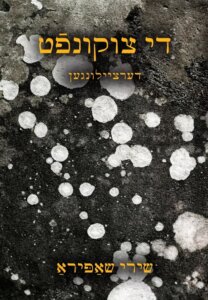
This is a revised version of the original article in Yiddish which you can read here.
Di Tsukunft (The Future)
A book of short stories in Yiddish
by Shiri Shapira
Leyvik House, 2025
You may not have heard about Shiri Shapira yet but you may do so soon. She’s one of the few young Israeli writers who are choosing to write in Yiddish, the language of her East European ancestors. A collection of her short stories was recently published by the Tel Aviv publishing house, Leyvik House, with the support of Israel’s National Authority for Yiddish Culture.
Like the author herself, the protagonists in her new collection of short stories and autobiographical pieces, Di Tsukunft (The Future), are average Israeli men and women with everyday worries about their livelihood, families and health problems. But beneath their daily routine lies a latent personal experience that waits for a critical moment to be revealed. When that moment arrives, the characters often enter a new phase of life.
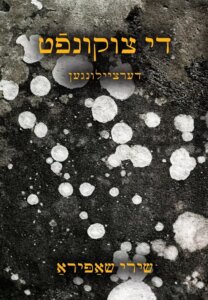
For the 13-year-old heroine of the opening story, also titled “The Future,” this happens in 2001. The terror attacks of 9/11 in New York City coincide with the onslaught of terror in her own town:
“The changes to daily life were immense. A seemingly endless series of discussion circles was held in memory of a victim from our school that I hadn’t known. Every morning I’d have to look at his smiling, pimpled face staring out from the enlarged photo that had been hung by the school gate.”
Thus 2001 ushered in the “terror attacks of the future […] up to the very skies, shining, silvery.” They became an indispensable part of the ‘new normal’ — for Shapira, the State of Israel and the entire world.
The word “future” is both the title of the book, and the name of the first and last stories in the collection. The term is key to Shapira’s work: for the author and her characters alike, the future is dangerous and uncertain.
Notably, “The Future” is also the name of one of the most important Yiddish literary periodicals, Di Tsukunft, published in New York from 1892-2010. In one of the more autobiographical pieces in the collection, also titled “Future”, Shapira writes about cataloging articles of Di Tsukunft for the Index to Yiddish Periodicals at the Hebrew University in Jerusalem. The concluding story “Future” highlights Shapira’s turning to Yiddish, which comes to loom so large in her life.
Shapira shares how she’d initially hoped to read the issues of Di Tsukunft and “learn everything about Jewish history.” Instead, she found herself reading the Israeli press, with its news of terror attacks in Israel, day after day, during the 2015-2016 wave of violence known as the “Intifada of the Individuals.” Israeli reality cancelled out the beautiful, visionary future of those long-ago Yiddish socialists: “What’s there to say about the future? The future’s a thing of the past.”
Shapira recalls: “As a child, I had the impression that I’d come too late for the past, and that someone whose past was shut off to them was of little use for the future.” Shapira references here a national oblivion around the “past”: Israeli society’s longtime neglect of Yiddish and Eastern European Jewish culture.
This neglect, however, served only to awaken her own interest in Yiddish. Historical inquiries and philosophical questions such as this one are woven skillfully into the narrative fabric of her stories.
Shapira’s characters live in Israel and speak Hebrew. Most of them don’t know Yiddish. Shapira herself is a Hebrew writer who has translated a significant number of works from German into Hebrew.
Sometimes Shapira’s tone is bitterly ironic, especially on the subject of the writer’s bleak lot in today’s society. The protagonist of “Self-Portrait as a Hebrew Writer” fantasizes about her ideal reader:
“He comes to an event celebrating my first book, my debut. […] He sits there, looking ridiculously handsome, listening to me babble about the difficult, wrenching labor of writing this text. When the musicians finish their part, he applauds energetically.”
The man reads her book twice and, as she comments ironically, “sees deep into her soul.” Their encounter takes them to the bedroom: “As he climaxes, he lets out a sweet sigh, a melody of contentment — like an enthused, eloquent review.”
So what role does Yiddish play here? Her stories suggest an answer.
In “Earthquake,” an elderly couple, Benny and Dalia, survive an earthquake in Jerusalem. Their modern apartment is unharmed, but many buildings in Shuafat, a Palestinian refugee camp in East Jerusalem, are destroyed, and around 700 people are killed. The couple’s Arab cleaning lady goes missing, and no one knows what happened to her.
For the couple, life goes on as usual. They quickly forget the cleaning lady, especially because they never even knew how to pronounce her name. Jews and Arabs make their home in the same town, but they live in completely different worlds.
Every night, Benny and Dalia eat dinner and nap a bit while watching a TV show. Something new does enter their routine; they sign up for a Yiddish class. Though they barely remember any of the Yiddish their parents once spoke, they hope they’ll “at least learn something before the next earthquake comes.”
The earthquake acts as a metaphor for the dramatic and tragic events that take place in Israel. These misfortunes cut through the monotony of the everyday, but soon enough life goes on as before. In such moments, Yiddish makes its appearance as a sort of phantom of Jewish history from which one might “at least learn something” before the next crisis hits.
Shapira remembers a feeling that used to disturb her as a child: “I was really young, and I thought that everyone besides me knew what to do in every situation, that they were grounded in their lives, while I was the only one floating in the air, not knowing where to land safely.” Yiddish, on the other hand, creates a kind of spiritual shelter, a ‘refuge’ where historical roots can be found.
Shiri Shapira has a keen sense of time in general and of the present moment in particular. In her stories, time flows naturally for months on end, then suddenly brings on changes in the lives of individuals and of society at large. Every day has the potential for danger. Written in Yiddish, Shapira’s stories build imaginary bridges between the troubling present and the past that has nearly disappeared from Israeli memory.
To buy the book, click here.
The post Millennial anxieties are the ‘new normal’ in these Yiddish stories appeared first on The Forward.
Uncategorized
An Arizona cemetery now requires mourners to leave before burial. A rabbi plans to sue.
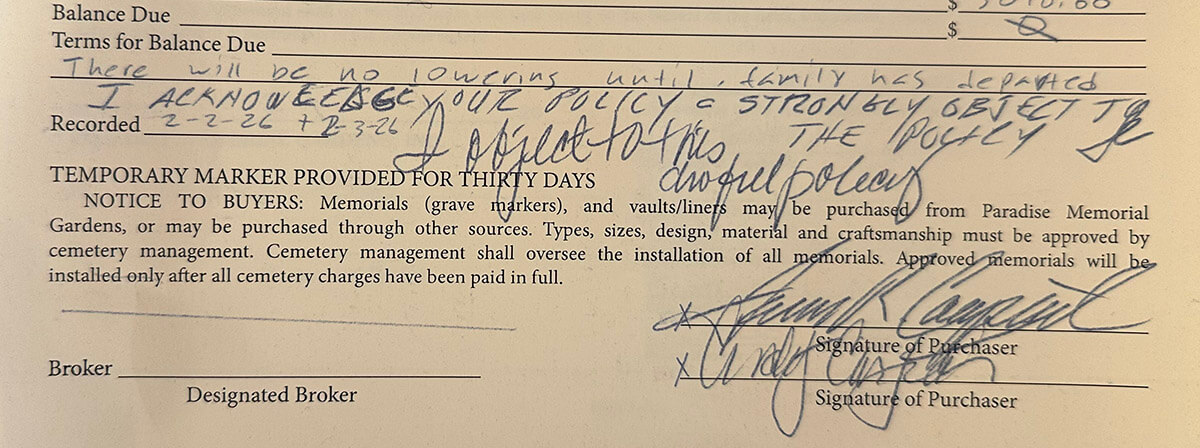
At Jewish funerals, the final act is often the simplest: the casket is lowered into the earth, mourners take turns with a shovel, and the grave slowly fills. It is a moment many rabbis describe as the essence of burial — the point at which ritual, grief and physical reality meet.
At a cemetery in Scottsdale, Arizona, that moment now does not happen.
A new safety policy at Paradise Memorial Gardens requires families to leave before a casket is lowered into the ground. Cemetery officials say the rule, which applies to all funerals, is necessary to prevent accidents, likely involving uneven ground, heavy equipment and mourners overcome with grief. But Jewish clergy say the policy interferes with a core religious ritual, and one local rabbi is preparing a lawsuit.
For Cindy Carpenter, 66, the dispute became painfully personal.
Her younger daughter, Chelsea, died at 33 of cancer in November. As Carpenter arranged the funeral, she and her husband purchased five burial plots at Paradise — for their two daughters, themselves and Chelsea’s husband — expecting the family would be buried together and according to Jewish practice. In total, the plots cost about $50,000, Carpenter said.
Eleven weeks later, Carpenter returned to the same cemetery to bury her older daughter, Cortney, who had significant disabilities and died at 40 after a long illness. Between the first funeral and the second, Carpenter said, the cemetery moved from compromise to refusal.
At Chelsea’s funeral, after intervention from local rabbis, mourners say they were allowed to stay but were placed around 20 feet away behind a rope while the casket was lowered. It was an imperfect accommodation Carpenter said she accepted. She understood the attempt to balance safety and tradition.
When Cortney died at the end of January, Carpenter said, that accommodation was gone. The standardized printed contract for the graveside service had added to it an additional handwritten note at the bottom stating that the casket would not be lowered until the “family has departed.” Carpenter said she was told that they had to leave the property altogether and that her request to stay inside a building at the cemetery and watch from a window was denied. Carpenter and her husband, Jim, signed under protest because the funeral was the next day.
Cindy added her own handwritten note: “I object to this awful policy,” while Jim wrote: “I acknowledge your policy & strongly object to the policy.”
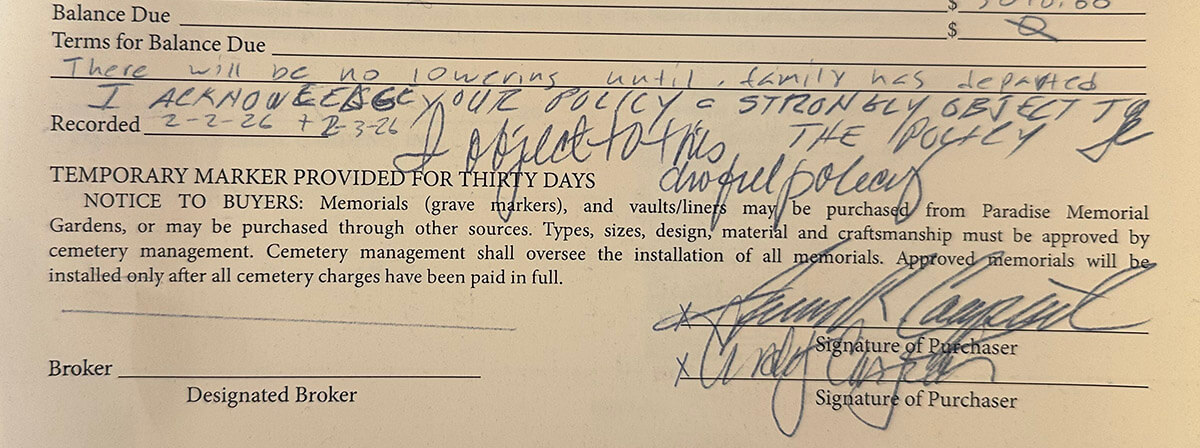
“We’re grieving parents for the second time in 11 weeks,” Carpenter said in an interview. “And you’re telling me I can’t stay to see my daughter buried?”
Rabbi Pinchas Allouche of Scottsdale’s Congregation Beth Tefillah, who officiated at the funerals for both of Carpenter’s daughters, confirmed that everyone who came for Cortney’s funeral was told they could not wait in their cars and had to leave the property. “It was horrible,” Allouche said.
Afterwards, Allouche sent his 24-year-old son back into the cemetery — dressed in a baseball cap and sunglasses — to pretend to be a random person visiting a nearby grave. “From there,” Allouche said, his son “took a video of the lowering of the casket and the covering of the grave for the family to have some slice of comfort in all this.”
Cemetery officials say the rule is not aimed at any one faith. Sabrina Messinger-Acevedo, CEO and owner of Messinger Mortuaries, which operates Paradise Memorial Gardens, said the cemetery is non-denominational and that its safety policies are applied uniformly. She acknowledged the new policy does “not fully align with certain religious traditions,” but said it was adopted after past incidents in which attendees failed to follow staff directions, creating safety concerns.
Messinger Mortuaries operates multiple funeral homes, cemeteries and crematories across Arizona, including Paradise Memorial Gardens, which has a large Jewish section.
Cortney’s funeral was Feb. 3, but the dispute did not gain attention until it was reported by the local news on Feb. 16. Carpenter said the delay was due to the non-stop coverage of the Tucson disappearance of Nancy Guthrie, the mother of Today show host Savannah Guthrie.
Eddie Dressler, a funeral director who has served Atlanta’s Jewish community since the 1990s, said he has never encountered a cemetery policy requiring families to leave before the lowering of a casket. “Having a rule like that is just crazy,” Dressler said.
The only similar restrictions he has seen are at some U.S. Department of Veterans Affairs cemeteries, which open multiple graves at once for logistical reasons — but even there, he said, exceptions are typically made for Jewish burial practices.
Safety and spirituality
Allouche said the rule removes what Jewish law considers the defining moment of burial. The lowering of the casket and the covering of the grave, he said, are not symbolic gestures but the final act of care for the dead — one traditionally performed with mourners present and often participating.
Allouche said he is working with an attorney and expects to challenge the policy, arguing that families who purchased plots in the cemetery did so with the expectation they would be able to bury loved ones according to Jewish practice. Applying the rule without exception, he said, effectively prevents that.
Rabbi Randy Brown, the resident rabbi at Arlington National Cemetery who has officiated at more than 900 funerals there, said safety concerns at gravesides are real. He has personally helped prevent people from falling in “dozens of times.”
But Brown said most cemeteries do not impose blanket bans. Instead, clergy, funeral directors and grounds crews typically coordinate accommodations, such as keeping families at a distance during the lowering and allowing them to return afterward to place earth on the grave, a practice that preserves both safety and ritual meaning.
Graveside funerals, he said, function both as sacred ritual and, with bulldozer equipment nearby, active work sites. Arlington, he added, approaches each burial individually — considering weather, terrain and family needs — rather than applying a single policy to every service.
Brown described the moment when earth strikes the casket as emotionally powerful for many mourners, recalling his own experience at his grandmother’s funeral as “visceral and cosmic.” That meaning, he said, is why cemeteries and clergy typically seek practical compromises. “It’s not one size fits all,” he said.
Religious disputes have surfaced elsewhere. In Atlanta in 2023, for example, a synagogue threatened to sue after a cemetery policy was seen by rabbis as interfering with Jewish burial customs. The cemetery eventually settled.
Allouche said he expects legal action to move forward. Some families who own plots at the cemetery have begun reconsidering their plans, he said, while others are waiting to see whether the cemetery revises its rules or reaches a compromise with community leaders.
Messinger-Acevedo said her company — founded in 1959 by her grandparents, Paul and Cora Messinger — has “deep roots in the community” and a commitment to serve families with “care and compassion.” She said they offer “partial refunds to families who choose to rescind the purchase of an unused burial space” — a complex decision for those with relatives already buried at the cemetery.
Carpenter said the dispute is not something she wanted to fight, but one she felt compelled to pursue. Nearly two decades ago, she founded Cortney’s Place, a day program for adults with disabilities created in her older daughter’s honor, and is now working with local clergy to create “Shabbat boxes” for Jewish patients in hospitals — small packages with challah, candles and grape juice inspired by Chelsea.
“I fought for them all of their life,” Carpenter said. “And this is no different.”
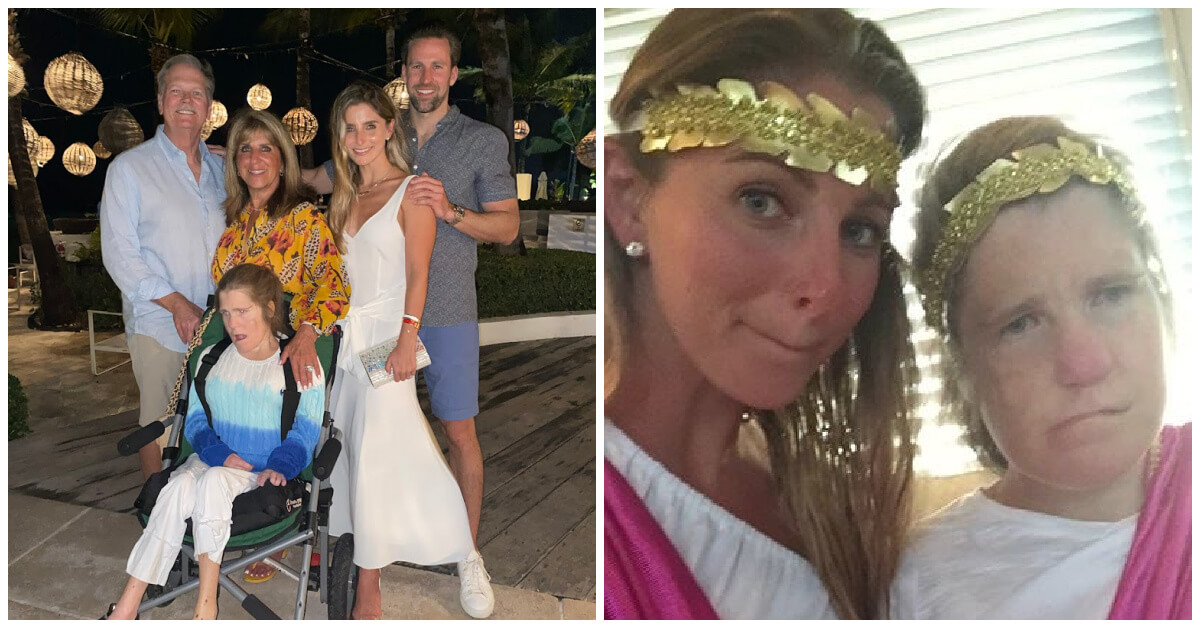
The post An Arizona cemetery now requires mourners to leave before burial. A rabbi plans to sue. appeared first on The Forward.
Uncategorized
Vanderbilt launches inquiry into instructor after math question about Israeli occupation draws criticism
(JTA) — Vanderbilt University has launched an inquiry into a mathematics lecturer whose classroom exercise about Palestinian territory drew criticism from the activist group StopAntisemitism.
Tekin Karadağ, a senior lecturer at the university’s department of mathematics, drew the ire of the antisemitism watchdog after it obtained a slide from one of his lectures that used a pro-Palestinian protest slogan and suggested that Israel was shrinking the Palestinian territory.
“Assume Palestine as a state with a rectangular land shape. There is the Mediterranean Sea on the west and the Jordan River on the east,” read the slide. “From the river to the sea, Palestine (…) was approximately 100 km. in 1946. The land decreases by 250 sq. km per year, due to the occupation by Israel. How fast is the width of the land decreasing now?”
Karadǎg, a Turkish national who received his PhD from Texas A&M University in 2021, included the question under “examples related to the popular issues” in a survey of calculus class, according to StopAntisemitism, which wrote in a post on X that Karadǎg was “bringing his anti-Israel, antisemitic bias into his classroom.”
In a statement shared with the Jewish Telegraphic Agency, Vanderbilt said that the content had been removed and that an inquiry had been launched into Karadağ.
“The university has received reports alleging a member of the faculty engaged in unprofessional conduct related to content shared during course instruction,” the school said. “The content in question has been removed, and a formal inquiry has been initiated consistent with relevant university policy.”
In recent years, rhetoric about the Israeli-Palestinian conflict on college campuses has grown increasingly fraught, with professors’ commentary on the region sparking heavy scrutiny and, at times, disciplinary measures when their universities have determined that they exceeded the bounds of academic freedom. A recent report by Columbia University’s antisemitism task force found that students frequently experienced pro-Palestinian advocacy in classes entirely unrelated to the Middle East — such as dance or math classes.
The inquiry was not the first time that Vanderbilt took swift action against the expression of pro-Palestinian sentiments on its campus.
In March 2024, the university, which has roughly 1,100 Jewish undergraduate students, was among the first universities to expel students who participated in pro-Palestinian demonstrations. This year, the school’s antisemitism “grade” from the Anti-Defamation League was bumped up from a “C” to an “A.”
The post Vanderbilt launches inquiry into instructor after math question about Israeli occupation draws criticism appeared first on The Forward.


